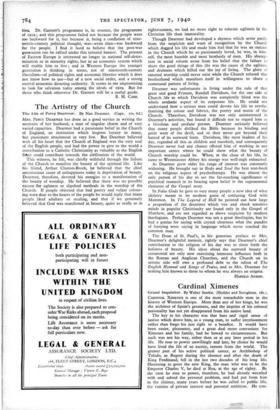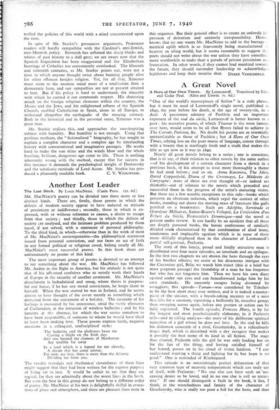Cardinal Ximenes
Grand Inquisitor. By Walter Starkie. (Hodder and Stoughton. 18s.). CARDINAL XIMENES is one of the most remarkable men in the history of Western Europe. More than any of her kings, he was the architect of Spain's greatness, and the imprint of his colossal personality has not yet disappeared from his native land.
The key to his character was that bare and rigid sense of justice which drove him, as a young man, to suffer imprisonment rather than forgo his just right to a benefice. It would have been easier, pleasanter, and a great deal more convenient for Ximenes and his family, had he bowed to circumstances. But such was not his way, either then or at any later period in his life. He rose to power unwillingly and late; by choice he would have lived the life of an ascetic, remote from the world. The greater part of his active political career, as Archbishop of Toledo, as Regent during the absence and after the death of King Ferdinand, fell in the last two decades of his long life. Hastening to greet the new King, the man who was to be the Emperor Charles V, he died at Roa, at the age of eighty. By the time he rose to power, therefore, he had already wrestled with and solved the personal problem, and had put from him in the cloister, many years before he was called to public life, the vanities of private interest and personal ambition. He con- trolled the policies of this world with a mind concentrated upon the next.
In spite of Mr. Starkie's persuasive arguments, Protestant readers will hardly sympathise with the Cardinal's anti-Jewish, anti-Moorish policy. Research has softened the sharp blacks and whites of past history to a dull grey; we are aware now that the Spanish Inquisition has been exaggerated and the Elizabethan burnings of Catholics too conveniently overlooked. The fifteenth and sixteenth centuries, as Mr. Starkie points out, were not a time in which anyone thought twice about burning people alive for other offences besides religion. Yet, for all that, Ximenes must seem to the modern mind more of a totalitarian than a democratic hero, and our sympathies are not at present attuned to him. But if his policy is hard to understand, the sincerity with which he carried it out commands respect. His shattering attack on the foreign religious elements within the country, the Moors and the Jews, and his enlightened reform of the Spanish Church, enabled Catholicism in Spain, alone in all Europe, to withstand altogether the earthquake of the ensuing century. Both in the historical and in the personal sense, Ximenes was a great man.
Mr. Starkie realises this, and approaches the awe-inspiring subject with humility. But humility is not enough. Using that perilous medium, the " fictionalised " biography, he has sought to explain a complex character and a complex age by interlarding history with conversational and imaginative passages. He works hard to make the sun shine and the winds blow and the whole bustling, brilliant, dangerous age come to life. There is nothing inherently wrong with the method, except that for success in this instance it demands the psychological insight of Dostoevsky and the scholastic rectitude of Lord Acton. Mr. Starkie has pro-
duced a pleasantly readable book. C. V. WEDGWOOD.



































 Previous page
Previous page